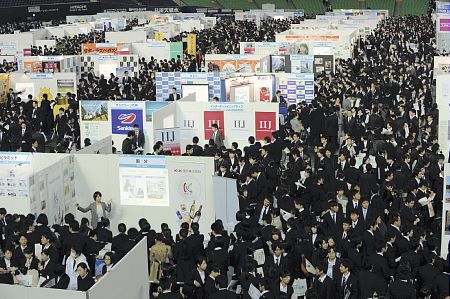
Dramatic Changes in People’s Lives in Japan

In the previous article, I discussed how sharing-economy services (businesses) have become popular among Japanese people, as we are desperate to cut down on daily expenses.
However, why have Japanese people needed to be so frugal?
This is the most common question that I have received from my foreign friends when I talk about the current economic or social situation.
If you want to know more about it, it is better for you to look into the microeconomy in Japan rather than macroeconomy like GDP.
Today, I will discuss dramatic changes in our lives in terms of income.
I believe that comprehending the negative consequence in this country will also help you understand what kind of issues people in a mature society have to face.
Sponsored Link
Dramatic increase in non-regular workers
According to the Ministry of Health, Labor and Welfare, the total working hours decreased from 2,064 (1990) to 1,721 hours (2017).
It sounds like Japan’s working environment has improved a lot. However, this is completely wrong and nothing more than fine-sounding talk.
If you look at diagram 1 above, it can be clearly seen that the average income per household has decreased in the last two decades although the rate of double-income household increased by more than 10%.
This shows that our lives have become tougher than before financially.
Actually, this is attributed to the sharp increase in the ratio of non-regular workers, but why has it happened?
Well, do you remember that previously I discussed that the deregulation of temporary employment (non-regular employment) was extended to the manufacturing industry after the collapse of Japan’s bubble economy?
Deregulation of temporary employment
As I discussed in Japan’s Economic Miracle 16, since after the collapse of Japan’s bubble economy, 16 Japanese managers of big companies have begun to discuss how Japanese companies would survive on global competitions (Japan Association of Corporate Executives: JACE).
They debated if they should review the Japanese management style based on the lifetime employment system and the seniority system for more than a year.
In 2002, a chairman of the conference of the general regulation reform took action, aiming to change the Japanese employment system.
He proposed the lifting of the ban on hiring contract (temporary) workers in the manufacturing industry to the Ministry of Health, Labor and Welfare.
The prime minister Junichiro Koizumi accepted the proposal and deregulation of temporary employment (non-regular employment) was extended to the manufacturing industry which had been prohibited until then.
As the rise of Asian competitors had become a menace to Japanese manufacturing companies, they needed to cut personnel expenses in order to be more price competitive.
Moreover, the government has kept extending the deregulation of temporary employment to multiple industries such as the education, medical, and even to city halls.
Large decrease in Japanese people’s income
The biggest difference between temporary and regular employment is that perquisites are not given to the temporary employees by companies such as bonus, transportation expenses, and etc, which can also be counted as part of income.
In addition, companies often terminate their employment contracts suddenly when their track records get worse. As a result, non-regular workers’ income tends to be much lower than full-time workers’.
Therefore, even if both husbands and wives are working, the average income per household can be expected to decrease in this society because it is inevitable that the proportion of non-regular workers keeps increasing due to the extension of the deregulation.
In other words, corporations have been able to decrease labor costs. Thus, simply it can be said that the government has prioritized corporations’ performance than citizens’ lives.
This is the mechanism of the sharp decrease in Japanese people’s income.
Large decrease in Japanese people’s income
Furthermore, what has spurred the deterioration of our financial condition is the rise in rent.
According to a recent study conducted by the Ministry of Internal Affairs and Communications, the ratio of rent or mortgage to salary (monthly) was 18.1% in 2013, which jumped up from 12.9% in 1993.
This is because the average rent increased from ¥540K to ¥648K yearly while *the average salary also decreased from ¥4.15M to ¥3.58M yearly.
*The previous discussion was about the average income per household.
As a result, we cannot spend a lot of money for ourselves.
To be continued…
Sponsored Link





























